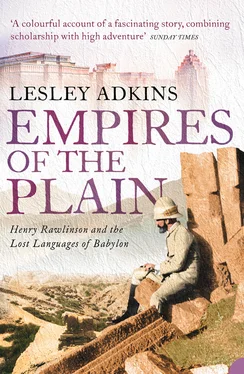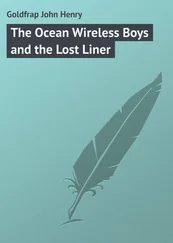The next day they marched 15 miles to the camp of another leader, Ahmed Khán, whose family, Rawlinson recorded, ‘are notorious for their intolerant spirit; and I should recommend any European traveller visiting the province of Pushti-kúh, in order to examine its remarkable antiquities, to appear in the meanest guise, and live entirely among the wandering I’liyát, who are mostly ‘Alí Iláhís, and are equally ignorant and indifferent on all matters of religion.’ 22 Rawlinson added: ‘In my own case, of course, I had nothing to apprehend, as I was marching at the head of a regiment, and the rulers of the province were anxious to propitiate the favour of the prince of Kirmánsháh, in whose service I was known to be; but I saw enough on this journey, and upon subsequent occasions, of the extreme jealousy and intolerance of the Wáli’s family, to feel assured that the attempt of an European to explore the country in an open and undisguised character, with any less efficient support, would be attended with the greatest danger.’ 23
On 4 March they reached Dizful at the foot of the mountains, the chief city of the province of Khuzistan and with, Rawlinson reckoned, about 20,000 inhabitants. After five days camped here, he rode over 20 miles south-westwards to the ancient city of Susa (or Shush), on the edge of the great alluvial plain of Mesopotamia. Although it had been the summer capital of Darius the Great, it had been founded as far back as 4000 BC and became the principal city of Elam. ‘At the tenth mile from Dizfúl,’ Rawlinson wrote, ‘the river makes an abrupt turn to the S.E., and the road then leaves it, and stretches across the plain to the great mound of Sús, which is, from this point, distinctly visible on the horizon. As I approached the ruins, I was particularly struck with the extraordinary height of this mound, which is indeed so great as to overpower all the other ruins in the vicinity.’ 24 Rawlinson described his first discovery: ‘Upon the slope of the western face of the mound is a slab with a cuneiform inscription of thirty-three lines in length engraved on it, and in the complicated character of the third column of the Persepolitan tablets.’ 25 What he had found was an inscription in the Elamite script, and he was told that the slab was ‘part of an obelisk, which existed not many years ago, erect upon the summit of the mound, and the broken fragments of the other parts of it are seen in the plain below’. 26
At Susa he had hoped to be able to find and record an inscribed stone nearly 2 feet high, apparently written in cuneiform on two sides and Egyptian hieroglyphs on one face, that previous travellers had been prevented from removing. He felt that such a bilingual inscription would be an asset in decipherment, as hieroglyphs had been deciphered thirteen years previously by Champollion, but he was bitterly disappointed: ‘I visited at this spot the pretended tomb of the Prophet Daniel; but the famous black stone, with the bilingual inscription, cuneiform and hieroglyphic, which formerly existed here, and by means of which I trusted to verify or disprove the attempts which have been made by St. Martin and others to decipher the arrow-headed character, no longer remains. It was blown to shivers a short time ago by a fanatical Arab in hopes of discovering a treasure; and thus perished all the fond hopes that archaeologists have built upon this precious relic.’ 27 Though this was a setback, Rawlinson found the place idyllic: ‘The ruins of Sús and the surrounding country are celebrated for their beautiful herbage: it was difficult to ride along the Shápúr [river] for the luxuriant grass that clothed its banks; and all around, the plain was covered with a carpet of the richest verdure. The climate too, at this season, was singularly cool and pleasant, and I never remember to have passed a more delightful evening than in my little tent upon the summit of the great mound of Sús – alone, contemplating the wrecks of time that were strewed around me, and indulging in the dreams of by-gone ages.’ 28
In mid-March they continued their trek and came to the banks of the Kuran River, where the town of Shuster was visible on the other side, its population drastically reduced after the devastation of the plague four years earlier. That same year the bridge across the river had been swept away by floods, ‘and, not having been repaired when I was there,’ Rawlinson noted, ‘we were obliged to bring the troops and guns across the river upon rafts, or kalaks, as they are called, supported on inflated skins. We pitched our camp along the pebbly beach, in the bed of the river; a most unsafe position, as a sudden rise of the waters would have swept it away bodily; but there was positively no other ground available.’ 29
A week later they began a five-day march towards the principal fortress of the Bakhtiari tribe, and after a halt of two days, ‘I accompanied the Prince a distance of 3 farsakhs [about eleven miles], to Khári-Shutur-zár, where he received the submission of the Bakhtiyárí chief, against whom our expedition was directed’. 30 The leader was Mohammed Taki Khan, and he held such power that he could ‘at any time, bring into the field a well-armed force of 10,000 or 12,000 men’. 31 Of the Bakhtiari tribe, Rawlinson observed that their ‘language is a dialect of the Kurdish, but still differing in many respects, and more particularly in their method of pronunciation, from any of the other modifications of that tongue which are spoken by the different tribes extending along the range of Zagros. I believe them to be individually brave, but of a cruel and savage character; they pursue their blood feuds with the most inveterate and exterminating spirit, and they consider no oath nor obligation in any way binding, when it interferes with their thirst of revenge; indeed the dreadful stories of domestic tragedy that are related, in which whole families have fallen by each others’ hands … are enough to freeze the blood with horror … Altogether they may be considered the most wild and barbarous of all the inhabitants of Persia; but nevertheless, I have passed some pleasant days with their chiefs, and derived much curious information from them.’ 32
Returning to Shuster, Rawlinson wrote to his brother George of his disappointment at the lack of military action: ‘I have marched to this place (Shuster) in command of a force of three thousand men, intending to attack and plunder the country of a rebellious mountain chief; but now that we are near his fort he shows the white feather, and wants to come to terms.’ 33 He acknowledged to his brother that the time nevertheless passed pleasantly, because he could indulge two of his passions – shooting game and visiting antiquities: ‘I am in a country abounding both with game and antiquities, so that, with my gun in hand, I perambulate the vicinity of Shuster, and fill at the same time my bag with partridges and my pocket-book with memoranda.’ 34
It had been nearly nine years since Rawlinson had left England, and at times he felt isolated and missed the close relationship with his family, as he confided gloomily in the long letter to George: ‘The only evil is the difficulty of communicating with any other civilised place from this said province of Khuzistan; it is nine months since I heard from England, and three since I heard from either Teheran or Baghdad, so that I am completely isolated and utterly ignorant of what is going on in any of the other regions of the globe. News from England I am particularly anxious for.’ 35 Moreover, friendships with other soldiers were proving to be ephemeral: ‘India has now ceased to be of any interest to me. I have few correspondents there, and each letter that I receive tells me a fresh tale of the worthlessness of worldly friendships. C—, who was wont to call himself my particular friend and chum, has never once written to me since he returned to India; and all my other quondam cronies have equally fallen off. But “out of sight, out of mind” is an old proverb, and I have no right, therefore, to complain of any particular grievance in my case.’ 36
Читать дальше












